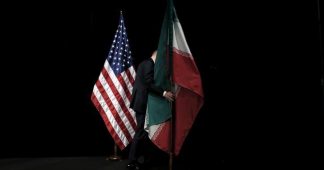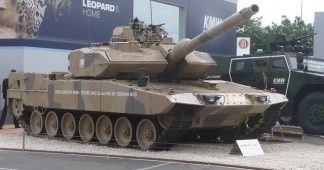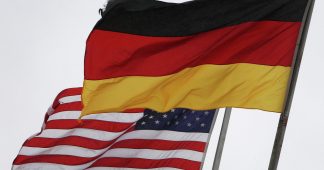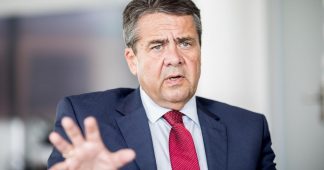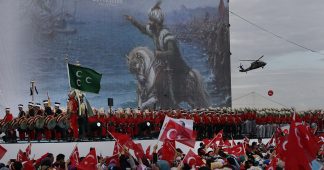by Victor Grossman
Apr 05, 2018
Photo by Uwe Hiksch
What were these indefatigable protesters demanding this time, here in Berlin and at rainy meetings, marches and bicycle parades during the long Easter weekend in over a hundred cities and towns all over Germany?
Good speeches and countless signs and banners, often hand-made, spelled it out: basically the same issue as ever: No war! The main slogan was “Don‘t arm, disarm!”
This was an urgent matter. The one cabinet member to retain her position in the new cabinet, Defense Minister Ursula von der Leyen, stuck to the same message: “We Europeans must be both militarily capable and politically resolute”. Germany must “assume its responsibilities”, she repeats, which translates to more and more modern armaments, her reply to convenient carping by the big brass that its weaponry is dated and ineffective; Germany needs more and better killing machines.
Concretely, this means complying with the NATO demand, loudly stressed by Donald Trump, that NATO members must increase military spending to 2% of their budgets by 2024—in Germany an expansion from about 37 billion euros now ($43.5) to almost double the amount. The Easter protesters pointed at urgent needs always neglected for “lack of funds”: infrastructure, childcare, education, care for the ill and elderly. One banner quoted figures: 19% of German children face problems of poverty which will haunt their entire future lives; in East Germany almost 25%. But, says von der Leyen, the Bundeswehr needs mighty Leopard panzers, the best automatic weapons, swiftest planes and ships, and training in landing operations and occupying hostile cities far from Germany’s safe shores.
One speaker named the one sector of infrastructure with high hopes for financial buttressing from the new government; improving road surfacing, strengthening bridges and heightening underpasses on highway routes leading eastward, where parades of tanks and other heavy weapons have already done damage when clanking toward the on-going military maneuvers of German, American and other NATO troops near the Russian borders. Is this, too, dejá vu all over again?
One sign recalled Bertolt Brecht’s warning words after World War II:
“Great Carthage waged three wars.
It was still powerful after the first, still habitable after the second.
It was nowhere to be found after the third.”
The speaker from the LINKE party recalled hesitant attempts by Foreign Minister Sigmar Gabriel to repair German-Russian relations and reduce confrontation in weapons and sanctions. He was ousted. His successor Heiko Maas, though also a Social Democrat (SPD), seems to approve the plans of his new colleague Ursula von der Leyen.
Maas also joined the now-fumbling British campaign to heat up relations with Russia after the increasingly opaque poisoning episode, adding the name and face of Vladimir Putin to the long tradition of simplified distortion, caricaturing and demonization of those one plans to attack. Both speakers and banners pointed out that media near-unanimity in this was hardly motivated by Russian human rights violations, election manipulation or actions outside its national borders. If it were, Saudi Arabia’s bloody flogging and executions against opponents and its genocidal war against Yemen, with U.S. assistance and beginning well before Trump, would have been castigated in angry UN speeches, not been smilingly accepted. But Minister Haas, with his new coalition armchair seat hardly warm, has already OK’d the sale of eight military patrol boats to Saudi Arabia. A tactless description of him as a “NATO-male hustler” by the often outspoken orator of the LINKE has given opponents a chance to denounce the entire peace demonstration! It has perhaps also led to new thinking.
Over and over, two places were named and seen on Saturday, always with the demand: “Close them down”! Ramstein Air Base in the Rhineland area is headquarters for the U.S. Air Forces in Europe, for Air Forces Africa and for the NATO Allied Air Command. Of the 600 or 700 U.S. bases in 70-80 countries outside America, it is the largest—and the base where messages from safe sites in the USA arrive, to be passed along to drones bringing death and destruction to Afghanistan, Iraq, Somalia and other a half dozen other countries in Africa and western Asia. Its presence is illegal under German law, and protests against this drone center, often organized by people joining in the Easter Marches, have led to growing pressure on the German government. Can they succeed?
The other name is Büchel Air Base, not far away. It is here, also in defiance of German laws by the governments of Merkel, Trump and their many predecessors, where twenty B61 nuclear bombs are stored—the only such site in Europe, alongside German and American bombers always ready to carry them eastwards.
It was such menaces which motivated the Easter March protests. Far too few took part; nasty weather, nasty media, the competing march of modern social media which may bring large numbers together but can lead to individualized effortless observation of world events, all in one’s own hand. But it also resulted from the failure of the Left to enthuse and mobilize large numbers of people.
And yet a deep desire for peace, reconciliation, a rejection of more deaths in Afghanistan, Mali, or other places where they don’t belong, is still present with many in Germany—and a political factor. Even when people don’t join marches, most aspiring politicians must take their feelings seriously.
This sentiment was expressed most vividly in the main speech Saturday, by a pastor, Rev. Eugen Drewermann. He based his speech on an old anti-war poem from 1778 by the poet Matthias Claudius, a writer and also pastor, who called out: “It’s war! It’s war!… What use to me are crown and land, gold and honor? … It’s war – and I want to bear no guilt for it!” His long speech, with an eloquence learned by some preachers, approached for me that of Dr. King in eloquence. Sharply but poetically he exposed those who want war and why they do and how they must be fought.
Also very emotional for some was the little “Children’s Hymn,” again by Bertolt Brecht, and vainly considered after World War Two and after German unification as a substitute for the still official anthem “Deutschland über alles”, whose original words called for German frontiers far beyond the present ones. Brecht’s song rejected all such bellicose dreams and pressures for expansion based on presumed Germanic superiority – and still all too present today. It’s singing, by so many in the crowd, brought tears to more than a few eyes. It too was a call for peace!
Children’s Anthem (Kinderhymne)
Translation (a difficult effort) by Michael E. Geisler
Grace spare not and spare no labor
Passion nor intelligence
That a decent German nation
Flourish as do other lands.
That the peoples need no flinching
At the crimes which we evoke
And hold out their hands in friendship
As they do to other folk.
Neither over or yet under
Other peoples will we be
From the Oder to the Rhineland
From the Alps to the North Sea
And because we’ll make it better
Let us guard and love our home
Love it as our dearest country
As the others love their own.
